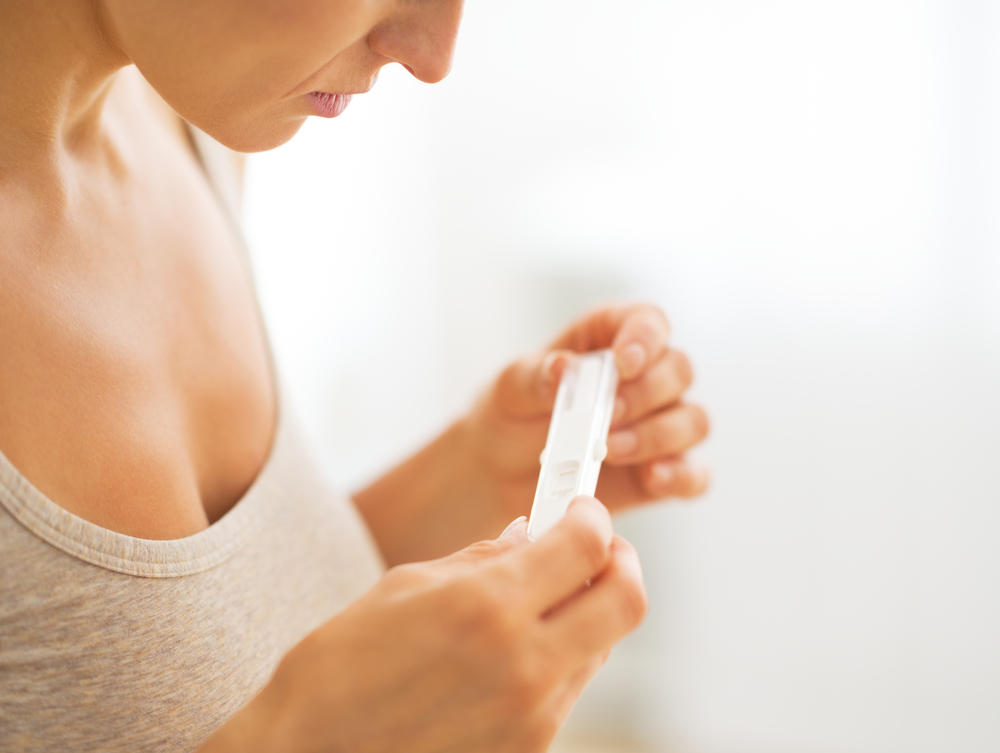
The first signs of pregnancy are different for every woman. While some have telltale symptoms (such as nausea and breast tenderness), others don’t know they’re expecting until they receive a positive pregnancy test. If you’re wondering, “How do I know if I’m pregnant?” read on to learn three ways to determine if a baby is in your future..
Early Pregnancy Symptoms
Some women experience early pregnancy symptoms as early as one week before their missed period. "Each one of these symptoms individually might be perceived like an illness or regular menstruation," says Stephen Rechner, M.D., the Division Chief of General Obstetrics and Gynecology at Spectrum Health in Grand Rapids. "When someone has more than one of the symptoms, she should take a pregnancy test to be certain whether or not she is expecting."
But it’s important to note that you could still be pregnant if you don’t have any symptoms. "If you feel no signs, that's OK too," says Cristina Perez, M.D., OB-GYN at the Women's Specialists of Houston at Texas Children's Pavilion for Women. "You're just lucky."
Here are some of the most common signs that you’re expecting a baby.
Tender, swollen breasts: A woman's breasts can become sore, sensitive, and heavy-feeling one or two weeks after conception. That’s because an increase in estrogen and progesterone causes the glands to grow.
Implantation bleeding: Pregnancy occurs after a fertilized egg implants into the lining of the uterus—usually about six to 12 days after conception. When this happens, some women experience “implantation bleeding” that’s lighter than a normal period, and it’s usually pink or brown in color.
Mild cramping: Implantation might also come with mild cramping that feels like tingling or pulling. Many women mistake this cramping for PMS.
Nausea: Feeling nauseas during early pregnancy is normal (although morning sickness won’t strike in full for a few weeks). You can partially blame the hormones human chorionic gonadotropin (hCG) and progesterone, which slows down your digestive process. "Although we don't know the true cause of morning sickness, we do know that pregnancy hormones play a large role," says Dr. Rechner
Fatigue: If you're pregnant, you might notice that you're completely exhausted. Chalk this one up to hormones too. "Many women feel tired because of the extra pregnancy hormone progesterone," says Dr. Rechner. "This symptom should go away during the second trimester, but might begin again in the third trimester."
Food aversions and cravings: Suddenly notice you can't stand a food you usually love, or you can’t shake an intense craving? Many women realize they're pregnant when they have newfound craving for (or aversion to) certain foods. This is another byproduct of the hormone shift.
Mood swings: Pregnancy hormone hCG might also lead to mood swings—which could also, of course, be exaggerated by your other pregnancy symptoms.
At-Home Pregnancy Test
Whether you’re experiencing early pregnancy symptoms or you simply missed a period, you should take a home pregnancy test. In order to get the most accurate reading, you'll likely have to wait until you miss your period, says Dr. Perez. That's because home pregnancy tests measure the level of pregnancy hormone hCG in your urine, and before your missed period, you may not have enough hCG for the test to pick up. (In general, a urine test needs 50 units of hCG to get a positive result, although some tests are more sensitive. Some women’s bodies take longer than others to produce that amount).
A negative home pregnancy test also doesn’t guarantee you aren’t pregnant. You could get a false negative by taking the test too early, using diluted urine, or not following the directions. If you still think you might be pregnant, "take another one the following week," recommends Dr. Perez.
Blood Test from the Doctor
For the most accurate way to know if you’re pregnant, head to your doctor's office to get a blood test. Blood tests are more sensitive than urine tests, since less hCG needs to be present to get a positive result.
Most women don't undergo a blood test if their at-home test was positive, but Dr. Perez explains that it can help evaluate for a miscarriage or ectopic pregnancy (a pregnancy in the fallopian tubes). Therefore she recommends scheduling an appointment once you get a positive pregnancy test.
